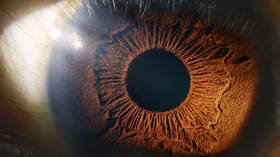‘Impossible’ breakthrough sees scientists successfully regrow optic nerve cells

Scientists have successfully regenerated damaged optic nerve cells from mice by stimulating production of a certain protein, providing hope for breakthrough treatments of numerous human eye diseases.
The research constituted “the strongest regeneration of any technique we've used before,” said ophthalmologist Keith Martin from the University of Melbourne in Australia. Martin added that the task of regenerating the optic nerve previously seemed “impossible.”
Mature nerve fibers lose their ability to regenerate following an injury or as a result of damage sustained through disease. The researchers wanted to see whether gene therapy focusing on reactivating part of nerve cells’ regenerative capabilities, a protein known as protrudin, might help turn the lights back on.
By stimulating production of this protein, the researchers were successfully able to regenerate nerve cell tissue, while also staving off damage by treating optical nerve cells taken from mice by preventatively treating them with protrudin therapy.
Also on rt.com Researchers create first ever artificial HUMAN TONGUE in latest 3D printing breakthroughFirstly, the researchers treated optical nerve cells in a dish in a lab to ramp up production of protrudin. These cells were then cut with a laser after which they managed to regrow further and faster than untreated cells.
After this success, researchers administered the gene therapy to mice, by injecting the genetic instructions to increase protrudin production directly into the animals' eyes. Within just a few weeks, the treated mice had more surviving nerve cells than the control group, showing the preventative properties of the treatment to fight off nerve damage.
In one final experiment, researchers removed treated retinas from mice subjects to see if the protrudin boost could stave off the death of nerve cells, for a time at least.
Three days after the retinas were removed, the researchers found that the boosted protrudin production had been almost “entirely neuroprotective, with these retinas exhibiting no loss of [retinal] neurons,” compared with an expected loss of roughly 50 percent of the retinal neurons.
It has yet to be determined whether protrudin injections would, in fact, restore sight in mice, let alone humans.
Researchers will now attempt experiments with human retinal cells in vitro while continuing their research with the mice. They are also examining possible applications for treating spinal cord injuries.
“It's possible that increased or activated protrudin might be used to boost regeneration in the injured spinal cord,” said Veselina Petrova, a neuroscience student at the University of Cambridge.
Previous research in 2012 and 2016, managed to regenerate nerves in certain areas of the eye but this latest research adds to a growing body of work which furthers our understanding of the human eye, adding to an ever-growing arsenal of treatments which could restore sight to many of the world's blind.
Also on rt.com Humans have the genes to REGROW their own eyes – they just got switched off through evolutionThink your friends would be interested? Share this story!













